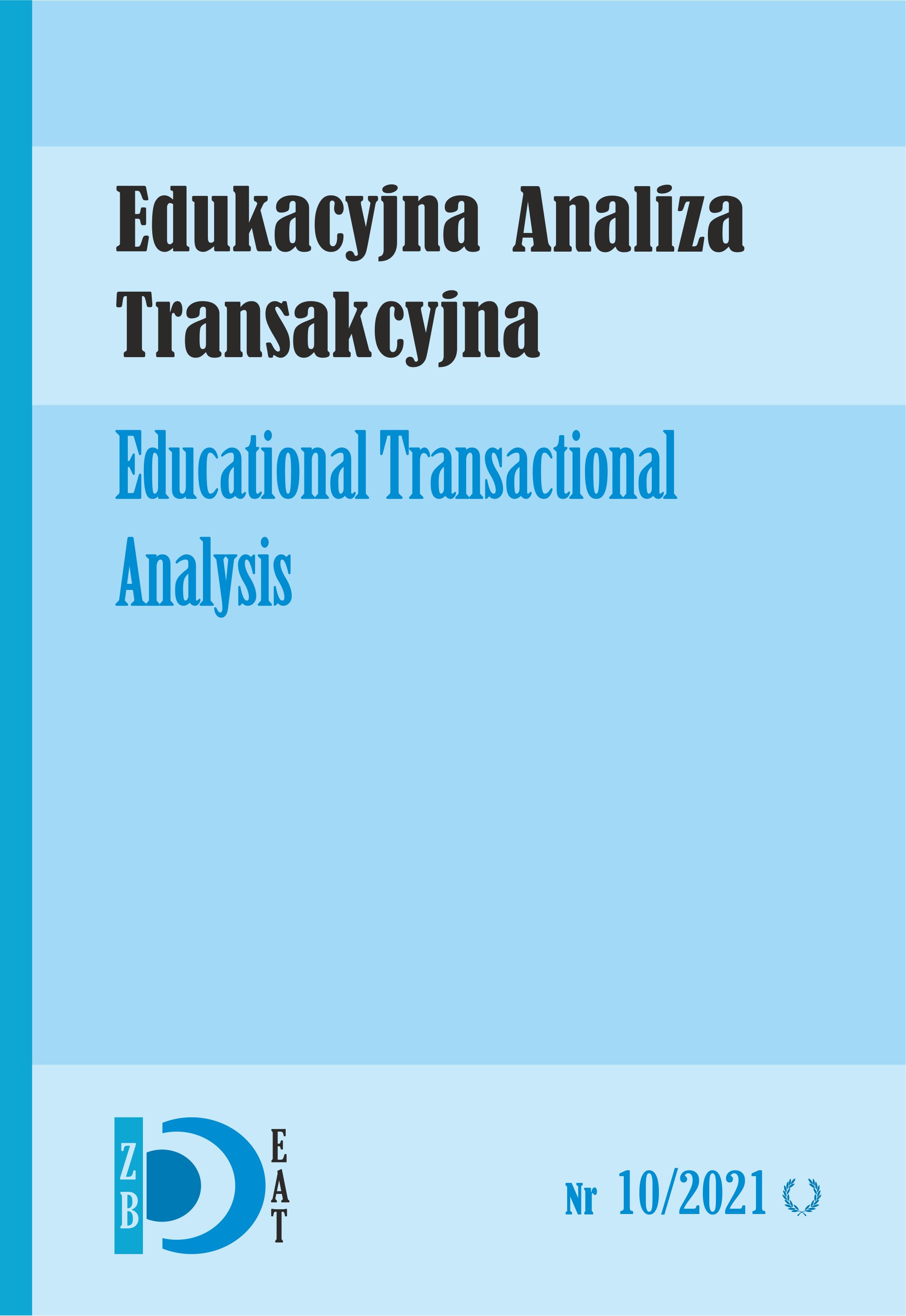Gratitude in Organisation in the eye of Transactional Analysis
DOI:
https://doi.org/10.16926/eat.2021.10.12Keywords:
gift giving, hospitals, gratitude, briberyAbstract
Gratitude is one of the rarest researched aspect of human interaction. Partially because in scientific reflection gratitude and gift giving is generally treated as a sign of corruption. Research held in Polish public hospitals on the topic of gift giving to medical staff shows that patients very precisely differentiate bribes from gifts as a token of gratitude.
In TA there there is very difficult to find any reflection about gratitude, however Erskine admits that need of showing gratitude appears to be one of the most significants relational needs he noticed. Gratitude is not easy to analyse in TA terms because it is both an emotion and cultural attitude. As an emotion it is a kind of joy, one of the four authentic emotions according Eric Berne. As a cultural response it activated equally three Ego States: Parent, Adult and Child. What is more – a need for showing gratitude in a form of benevolent action toward the person someone feels gratitude for and this is an occasion to make a step towards intimacy.
Downloads
References
Chang Seek Lee, (2020), Perspectives of Science & Education International Scientific Electronic Journal ISSN 2307-2334 (Online) Available: psejournal.wordpress.com/archive20/20-06/ Accepted: 25 September 2020 Published: 31 December 2020 (odczyt 25.09.2021)
Emmons, R. A., & Shelton, C. M. (2002). Gratitude and the science of positive psychology. Handbook of positive psychology, 18, 459-471.
Park, Peterson, and Seligman. (2004). Strengths of Character and Well–Being, Journal of Social and Clinical Psychology, Vol.23, No.5, 2004. pp. 603-619.
Sharma, A., Johnson, L., Caruso Brown, A., Unguru, Y., Lantos, J., D., (2018), An Extravagant Gift From a Grateful Patient, Pediatrics, Jun 2018, Vol. 141 Issue 6, p1-5. 5p. DOI: 10.1542/peds.2017-2837.
https://pediatrics.aappublications.org/content/141/6/e20172837 (odczyt 29.09.2021)
Steward I., Joines V., (2016), Analiza Transakcyjna dzisiaj, Rebis, Poznań.
Seidlitz, L., Wyer Jr, R. S., & Diener, E. (1997). Cognitive correlates of subjective well-being: The processing of valenced life events by happy and unhappy persons. Journal of Research in Personality, 31(2), 240-256. 13. McCullough, M. E., Kilpatrick, S. D., Emmons, R. A., & Larson, D. B. (2001). Is gratitude a moral affect? Psychological bulletin, 127(2), 249.
Sypniewski J., (2021), Wymiana darów – pomijany wymiar rzeczywistości organizacyjnej w szpitalach” praca doktorska Wydział Zarządzania i Komunikacji Społecznej Uniwersytetu Jagiellońskiego
Tedeschi, R. G., & Calhoun, L. G. (2004). " Posttraumatic growth: Conceptual foundations and empirical evidence". Psychological inquiry, 15(1), 1-18.
Wardhani, N., Agustiani, H., Hutasuhut, I., J., Gimmy, A., (2020), An exploration of gratitude themes and dynamics in academic context: an initial study on students in Indonesia, w. EurAsian Journal of BioSciences Eurasia J Biosci 14, 7133-7136.
Watkins, P. C., Woodward, K., Stone, T., & Kolts, R. L. (2003). Gratitude and happiness: Development of a measure of gratitude, and relationships with subjective well-being. Social Behavior and Personality: an international journal, 31(5), 431-451.
Wood, A. M., Joseph, S., & Maltby, J. (2009). Gratitude predicts psychological well-being above the Big Five facets. Personality and Individual differences, 46(4), 443-447.
Downloads
Published
How to Cite
Issue
Section
License
Copyright (c) 2022 Jacek Sypniewski

This work is licensed under a Creative Commons Attribution 4.0 International License.
I am aware that the Educational Transactional Analysis journal is published under a Creative Commons license - Attribution (https://creativecommons.org/licenses/by/4.0/legalcode).
By submitting the article, I agree to make it available under this license

